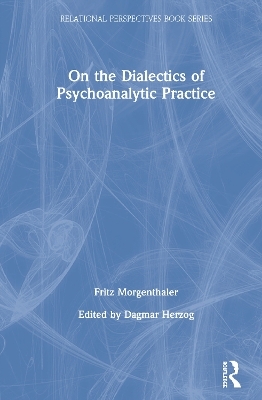
On the Dialectics of Psychoanalytic Practice
Routledge (Verlag)
978-0-367-33767-4 (ISBN)
Fritz Morgenthaler was a crucial figure in the return of psychoanalysis to post-Nazi Central Europe. An inspiring clinician and teacher to the New Left generation of 1968, he was the first European psychoanalyst since Freud to declare that homosexuality is not, indeed never, a pathology, and in Technik, developed revolutionary ideas for transforming clinical technique. On the Dialectics of Psychoanalytic Practice offers the first publication in English of this psychoanalytic, counterculture classic.
Those who first picked up Technik encountered it at a historical moment when Marxist psychoanalyst Wilhelm Reich, popular New Left cultural critic Klaus Theweleit, and the texts of the Frankfurt School were already required reading. While not a political text in the same direct way, Morgenthaler’s Technik nonetheless shared many of their preoccupations and conclusions about human nature. It was read as technical guidance for psychoanalysts, but also as a manifesto dedicated to the problem of how it might be possible genuinely to live a postfascist, and nonfascist, existence. Morgenthaler was a protorelationalist who recombined the traditions of ego and self psychology as he retained a commitment to drive theory. Here Dagmar Herzog makes his work available to a new generation of analysts, providing essential source material, annotations, and groundbreaking analysis of the continued importance of the work for historians and therapeutic practitioners alike.
On the Dialectics of Psychoanalytic Practice will interest practicing clinicians as well as intellectual historians and cultural studies scholars seeking to understand the return of psychoanalysis to post-Nazi Central Europe.
Fritz Morgenthaler (1919–1984) was a prominent Swiss physician, psychoanalyst, ethnologist, and painter. Cofounder of the interdisciplinary field of ethnopsychoanalysis, his writings on clinical practice, sexuality, and dream interpretation were essential reading for the counterculture and New Left in Continental Europe. Dagmar Herzog is Distinguished Professor of History at the Graduate Center, City University of New York. She is the author, most recently, of Cold War Freud: Psychoanalysis in an Age of Catastrophes (2017) and Unlearning Eugenics: Sexuality, Reproduction, and Disability in Post-Nazi Europe (2018).
Part I Technik: 1. Theory of Technique and Analytic Process 2. Sequentiality in the Course of Associations 3. Setting Priorities—and Relativizing Them 4. The Actualization of the Transference-Conflict 5. Identification 6. The Transference-Resistance 7. The Dynamic of Contradictions in the Interpretive Process 8. The Working-Through of a Transference-Resistance 9. Function and Structure of Reconstructive Interpretation 10. Many Paths Lead to No Destination Part II Supplementary Material: 1. Review of Heinz Kohut, The Analysis of the Self: A Systematic Approach to the Psychoanalytic Treatment of Narcissistic Personality Disorders 2. Letter to Heinz Kohut, September 25, 1977 3. Modes of Interaction in Perversions and Perversion of Modes of Interaction
| Erscheinungsdatum | 06.04.2020 |
|---|---|
| Reihe/Serie | Relational Perspectives Book Series |
| Zusatzinfo | 3 Illustrations, black and white |
| Verlagsort | London |
| Sprache | englisch |
| Maße | 156 x 234 mm |
| Gewicht | 453 g |
| Themenwelt | Geisteswissenschaften ► Psychologie ► Psychoanalyse / Tiefenpsychologie |
| Medizin / Pharmazie ► Medizinische Fachgebiete ► Psychiatrie / Psychotherapie | |
| ISBN-10 | 0-367-33767-3 / 0367337673 |
| ISBN-13 | 978-0-367-33767-4 / 9780367337674 |
| Zustand | Neuware |
| Informationen gemäß Produktsicherheitsverordnung (GPSR) | |
| Haben Sie eine Frage zum Produkt? |
aus dem Bereich


